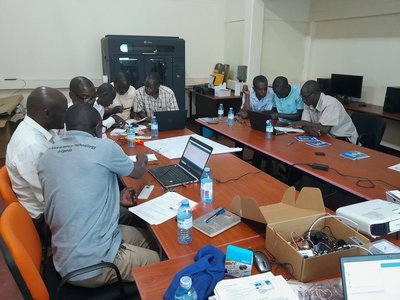

University lecturers and students came together for workshops, lectures, and discussions, fostering knowledge exchange and innovation. Here’s a recap of the week’s highlights:
Day 1: Laying the Foundation
The week began with a team meeting featuring John Baptist Kirabira, Hillary Kasedde from Makerere University and Rafat AlAfif and Florian Pröll from BOKU. The group meticulously planned upcoming lectures and practical courses, reviewed feedback on a student’s dissertation presentation, and mapped out the next steps in their ongoing collaboration. In the afternoon, the team visited the lab and makerspace, ensuring all equipment—from 3D printers to workstations—was ready for the practical course. This preparation underscored the hands-on, technology-driven approach that would define the week.
Day 2: Learning and Doing
The day kicked off with a lecture on hybrid energy systems by Rafat Al Afif, drawing faculty members and students eager to explore cutting-edge renewable energy solutions. Following this, Florian Pröll introduced the Maker Movement, emphasizing its role in fostering creativity and innovation through open-source tools and collaborative problem-solving.
The afternoon brought theory to life as participants dived into a practical course inspired by the maker movement. Guided by the "learning by doing" philosophy, teams of two or three immediately began building basic electrical circuits and first program sketches. The aim of introducing participants to the ease of automation using widely available open-source hardware and software is falling on fertile ground. By the end of the day, participants were not only familiar with basic coding syntax but also inspired by the possibilities of open-source hardware.
Day 3: Building Skills
The practical course continued with new challenges, such as using a light-dependent resistor (LDR) to control an LED based on ambient light, connecting and printing to an OLED display, measuring temperature with a digital sensor and combining temperature measurements with OLED display outputs. The day ended with teams brainstorming potential projects, leveraging their newfound skills to create innovative applications.
Day 4: Innovating with 3D Printing
Participants revisited previous tasks and explored 3D printing. Despite a technical issue with the printer, the group gained a theoretical understanding of its applications and potential. The final tasks introduced stepper motor control, with teams programming microcontrollers for automated movements. Armed with hardware, software, and curiosity, teams began creating their own projects. Ideas ranged from automated solar trackers to measuring and displaying sensor-data.
Day 5: Wrapping Up and Looking Ahead
The final day focused on refining and presenting projects. Participants tackled challenges like water level measurement using a darlington-transistor-array and microcontroller-based automation systems. Team projects showcased innovative uses of maker tools, from solar trackers to sensor integration.
The day concluded with discussions about the practical course's outcomes, its impact, and the potential for hybrid energy applications. Participants shared feedback through a questionnaire, and the team set the stage for future collaborations.
Later, a promising Master’s thesis proposal on hybrid renewable energy systems was reviewed, with an agreement for joint supervision between Makerere University and BOKU University.
This week demonstrated the power of collaboration and innovation in advancing renewable energy education. The blend of lectures, hands-on activities, and creative exploration left participants inspired and equipped to drive change in their fields.
